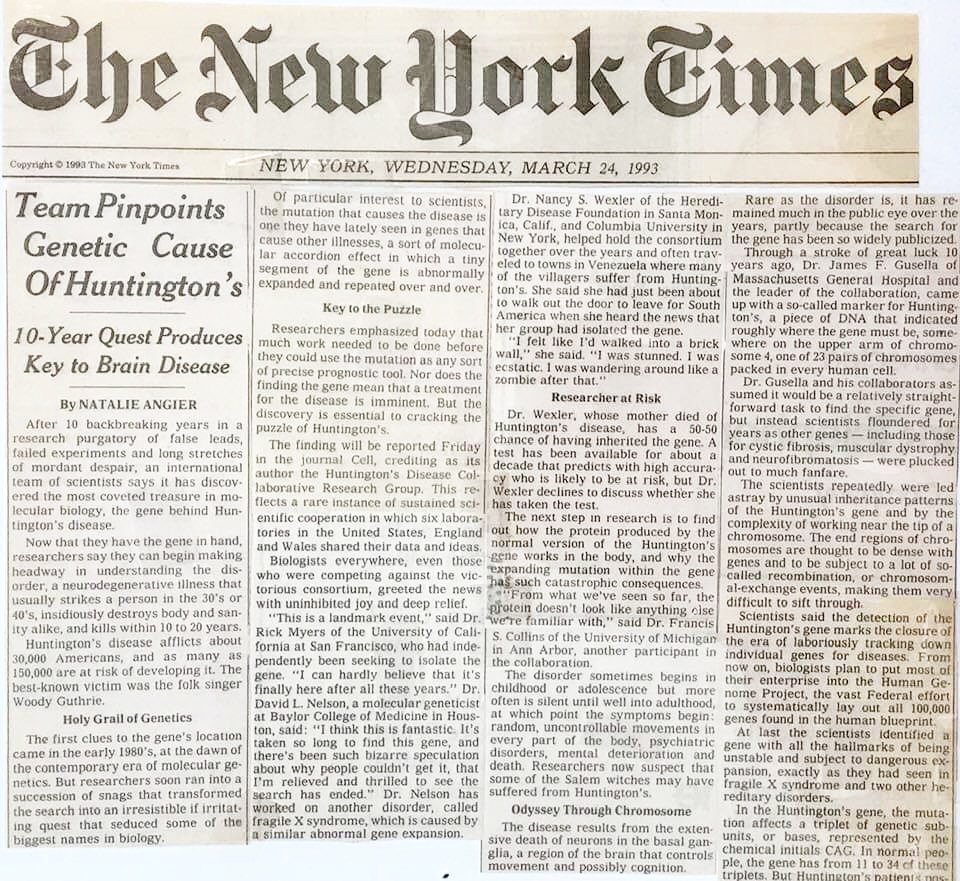The Huntington’s Disease Headline I Can’t Wait to See
Written by |

 (Photo from James Pollard, Personal Collection)
(Photo from James Pollard, Personal Collection)
The above New York Times clipping, dated March 24, 1993, reports breaking news that was immensely important for the Huntington’s disease community. Even today, 26 years later, the significance of a piece of HD news has never surpassed this. Not yet anyway.
The Times’ article (with photo originally posted on Facebook by Huntington’s disease advocate James Pollard and used here with his permission) describes how after a decade of trying to isolate the Huntington’s disease gene, it had finally been located by a team of scientists.
At that point in history, everything changed for HD researchers, families, and gene-positive individuals. Scientists would begin to learn everything they could about that gene to start working toward a treatment for HD. Knowing the gene’s location enabled researchers to know where to focus their study and attack.
This discovery also means people living at risk for HD can now undergo genetic testing to learn whether they are likely to develop Huntington’s disease later in life. This provides more options for these individuals to make informed decisions about family planning, employment, and life in general.
It’s hard for me to imagine what life was like for those living at risk for HD before genetic testing was available. Having access to the genetic test if desired is so integral to the Huntington’s disease experience today, that not having it there seems unthinkable.
I wasn’t involved with the Huntington’s disease community at that time, but I can imagine that the excitement surrounding this 1993 announcement must have been incredible. Reading through the Times article, you can see in the quotes that even the researchers were in a state of amazement. Before this time, HD was a disease in the shadows, and it was not uncommon for families affected by the condition to try to keep it hidden. With this announced discovery, however, that began to change.
Since 1993, a great deal of progress has been made in the quest for an HD cure. The scientists have been working like mad people. I visited Google Scholar and ran a search for “Huntington’s disease” with the date range of 1993 to 2019. The resulting list came back at 75,900 scholarly articles on HD. Now, I didn’t read through the entire list, but I can assure you, that’s a lot of smart people with a focus on HD.
There has never been more hope in the Huntington’s disease community than there is right now. Ground-breaking advances are being made and new clinical studies are introduced on a frequent basis. Right now, there are real HD-affected individuals taking real test compounds that might one day be an effective treatment for all of us. Maybe a cure. These people are heroes, and their numbers are increasing as new studies commence.
I was inspired by the 1993 New York Times clipping to imagine what Huntington’s disease-related news I would like to see reported in a future headline. What article will I clip out of a newspaper (or print off Twitter, I suppose) to post on my refrigerator? I imagine it would be something like this:
Celebration in the HD community as disease-delaying drug now available for all!
Or something similar. Wow. That would be a reason to move the 1993 announcement down to No. 2 on the list of most important Huntington’s disease headlines. I can’t wait to see it happen.
***
Note: Huntington’s Disease News is strictly a news and information website about the disease. It does not provide medical advice, diagnosis, or treatment. This content is not intended to be a substitute for professional medical advice, diagnosis, or treatment. Always seek the advice of your physician or other qualified health provider with any questions you may have regarding a medical condition. Never disregard professional medical advice or delay in seeking it because of something you have read on this website. The opinions expressed in this column are not those of Huntington’s Disease News, or its parent company, Bionews Services, and are intended to spark discussion about issues pertaining to Huntington’s disease.



Leave a comment
Fill in the required fields to post. Your email address will not be published.